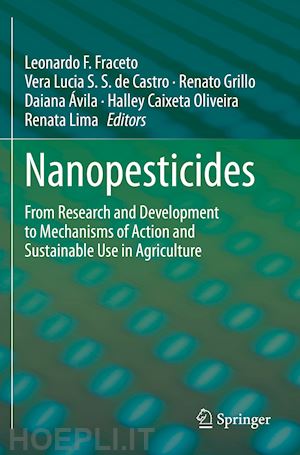
Questo prodotto usufruisce delle SPEDIZIONI GRATIS
selezionando l'opzione Corriere Veloce in fase di ordine.
Pagabile anche con Carta della cultura giovani e del merito, 18App Bonus Cultura e Carta del Docente
Leonardo F. Fraceto holds a PhD in Molecular and Functional Biology from São Paulo State University, where he has developed carrier systems for herbicides and other compounds of interest for pest control in agriculture, resulting in research articles and patents. In addition, he has conducted studies on long-term repellents for controlling arboviruses and pests.
Vera Lúcia de Castro holds a PhD in Experimental Pathology from the University of São Paulo and joined Embrapa to develop ecotoxicology studies in non-target organisms. Her main focus is on the ecotoxicological effects of photocatalytic nanoparticles and hybrid nanomaterials on aquatic organisms, as well as the effects of nanoparticles and nanopesticides.
Renato Grillo is a Professor of Chemistry and Biochemistry at São Paulo State University. He received his PhD and MS degrees from the University of Campinas and was a post-doc at the International Iberian Nanotechnology Laboratory and Federal University of ABC. He is an expert on environmental nanotechnology, including the development of nanostructured solutions for the controlled release of pesticides, interactions of nanomaterials with natural colloids, exposure and risk assessment.
Daiana Ávila holds a PhD in Toxicological Biochemistry from the Federal University of Santa Maria and completed her postdoc at Vanderbilt University. Currently an Associate Professor at the Federal University of Pampa, her research focuses on nanotoxicology using Caenorhabditis elegans as an alternative animal model. She received the “For Woman in Science- L´Oreal/UNESCO/ABC” Award in 2015.
Halley Caixeta Oliveira holds a PhD in Molecular and Functional Biology from the State University of Campinas and completed his postdoc in Plant Physiology at the same institution. He is currently an Associate Professor at the State University of Londrina. An expert on plant biochemistry and physiology, his research focuses on how plants respond to abiotic stresses and how we can improve plant performance in a scenario of climate change by exploring the application of nanotechnology in agriculture and the plant sciences.
Renata de Lima holds an MSc in Genetics and Evolution from the Federal University of São Carlos and a PhD in Medical Sciences from the State University of Campinas. She was the coordinator of the Biotechnology and the Engineering of Biotechnology and Bioprocess undergraduate courses at the University of Sorocaba. Her current research areas are ecotoxicology, toxicity of nanomaterials, environmental mutagenesis, agrochemicals and biocides.











Il sito utilizza cookie ed altri strumenti di tracciamento che raccolgono informazioni dal dispositivo dell’utente. Oltre ai cookie tecnici ed analitici aggregati, strettamente necessari per il funzionamento di questo sito web, previo consenso dell’utente possono essere installati cookie di profilazione e marketing e cookie dei social media. Cliccando su “Accetto tutti i cookie” saranno attivate tutte le categorie di cookie. Per accettare solo deterninate categorie di cookie, cliccare invece su “Impostazioni cookie”. Chiudendo il banner o continuando a navigare saranno installati solo cookie tecnici. Per maggiori dettagli, consultare la Cookie Policy.